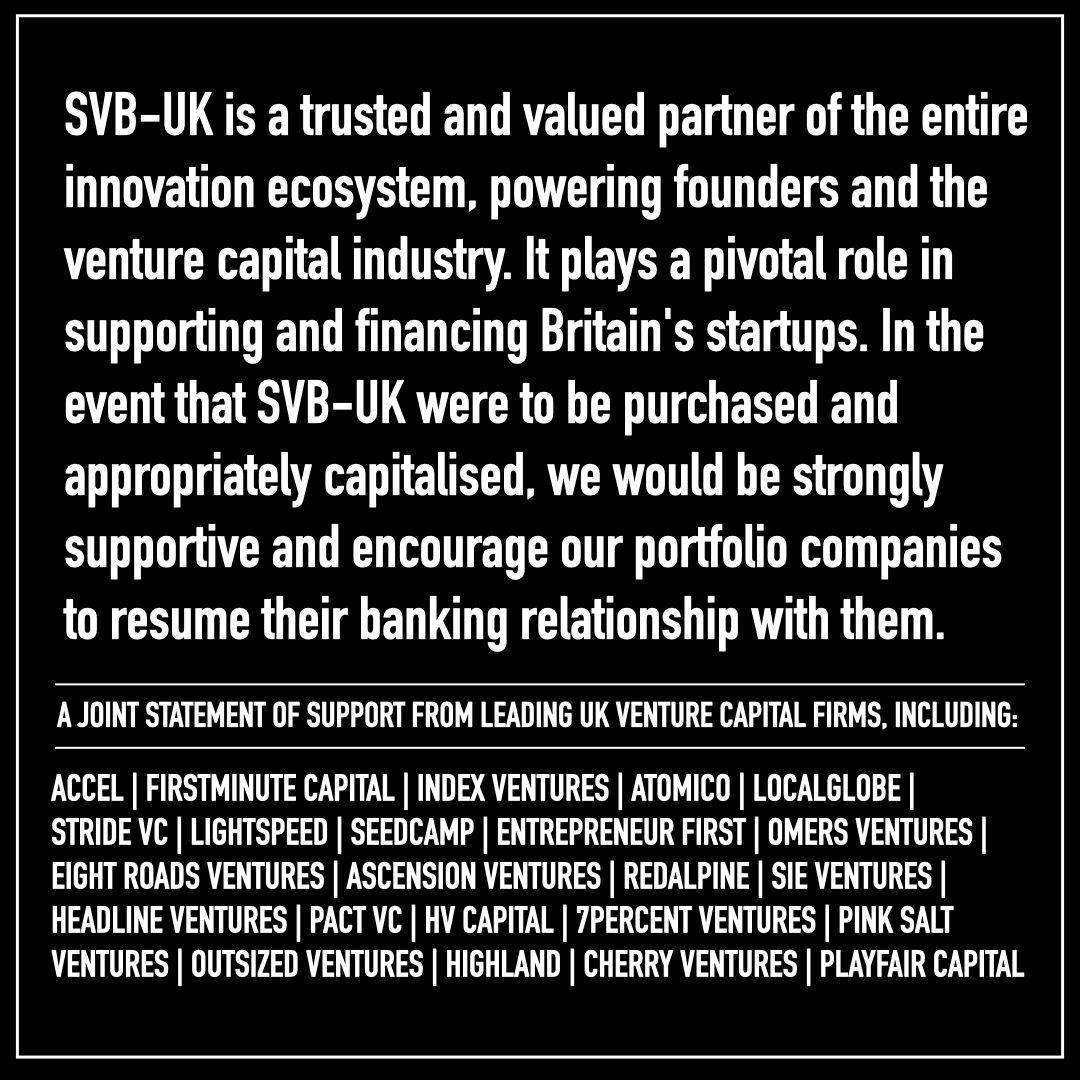As of late Thursday night and Friday morning, the fallout from the shutdown of Silicon Valley Bank in the U.S. had reached the shores of the U.K. and Europe. Yesterday afternoon, the Bank of England sought a court order to place Silicon Valley Bank UK Limited — the U.K. arm of the U.S. institution — into an insolvency procedure.
In a statement, the BoE said: “SVB UK has a limited presence in the UK and no critical functions supporting the financial system. In the interim, the firm will stop making payments or accepting deposits.” SVB UK confirmed it would be put into insolvency from this Sunday evening (tomorrow).
The move could affect as much as 30% of UK tech startups, with potentially 10% in trouble, industry sources estimate.
As of today, TechCrunch understands an influential group of U.K. entrepreneurs and investors, aided by industry body Coadec, is now making hasty representations this weekend to HM Treasury over the implications of SVB U.K.’s shut down.
Additionally, a group of VCs released the following statement, which reads: “SVB-UK is a trusted and valued partner of the entire innovation ecosystem powering founders and the venture capital industry. It plays a pivotal role in supporting and financing Britain’s startups. In the event that SVP-UK were to be purchased and appropriately capitalised, we would be strongly supportive and encourage our portfolio companies to resume their banking relationships with them.”

UK investors’joint statement on SVB-UK shut-down
It’s understood the UK Prime Minister’s office, Number 10 Downing Street, is working the weekend to assess the impact on its tech industry.
Separately, some 210 (and counting) UK Tech CEOs and founders (employing an estimated 10,000 people), have written to the chancellor about the issue.
And in a breaking development, Sky News reported that the Bank of London (TBOL) (a clearing bank) is allegedly looking at a rescue bid for SVB UK.
The collapse of the U.S. bank came after it tried to raise $2.25 billion to offset losses from the sale of (mainly) U.S. government bonds, leading to a 60% share price collapse, with customers and investors subsequently racing in droves to empty their accounts.
Up until Friday morning, there was no obvious threat to the U.K. operation from the fallout happening in the U.S. SVB UK was legally and operationally a stand-alone entity from the U.S. arm. (SVB U.K. secured a U.K. banking license in 2012 but became a U.K. stand-alone bank in August 2022 and has 700 full-time employees.)
Furthermore — post the 2008 financial crisis — all U.K. banks were required by law to separate core retail banking services from their investment and international banking activities under what is known as “ring-fencing.”
However, on Friday morning, the Financial Times reported that SVB U.K. had sought £1.8 billion of liquidity from the BoE, which can supply emergency funding to a bank, so long as it has adequate collateral, via the BoE’s discount window facility.
Also on Friday, SVB UK CEO Erin Platts held a Zoom call with hundreds of U.K. investors and founders present, saying the U.K. bank’s deposits were separate from the U.S. entity.
Platt’s entreatments did not, however, prevent the panic about events in the U.S. from spreading amongst U.K. VCs and tech founders.
Word spread like wildfire across U.K. tech WhatsApp groups, as SVB U.K. account holders moved to withdraw their cash from Thursday night onward, following the news in the U.S.
Only hours after Platt’s call, the BoE moved in to shut down the bank’s operations.
While some investors TechCrunch has spoken to said they had told their portfolio companies to “diversify” the number of bank accounts used by their businesses, it was clear by Friday afternoon that the vast majority had simply told companies to simply “get out” of SVB U.K.
Hussein Kanji, co-founder of Hoxton Ventures (which has raised a total of $355 million across three funds) tweeted confirmation that they had advised portfolio companies to move funds out of SVB “because it is a bank run.” In an echo of points made by U.S. VC Mark Suster about how panic amongst VCs had boosted the SVB crisis (and in a possible reference to the effect of the Streisand effect), Kanji tweeted: “The law firms and other VCs caused the panic imho. There was no crisis before this.”
On Friday afternoon, Mark Tluszcz, CEO of Mangrove Capital Partners in Luxembourg (which has raised a total of $819.2 million across five funds), tweeted: “If you are not advising your companies to get the cash out, then you are not doing your job as a Board Member or as a Shareholder. Daily life in startups is risky enough, don’t play with your lifeline…”
Under insolvency law in the U.K., depositors are eligible for up to £85,000 ($102,000) of compensation for lost deposits. But, of course, hundreds of millions of pounds is held on SVB UK’s balance sheet from U.K. founders and investors. In addition, SVB U.K. is commonly used as a payroll facility by many startups, as TechCrunch has reported in the U.S. as regards startups there.
Startup fallout
The situation could have an enormous impact on the U.K. startup industry.
Matthew Clifford, co-founder of Entrepreneur First, tweeted that “there could be 300 UK startups struggling to meet payroll next week.”
On Friday, TechCrunch understands several VC firms in Europe told LPs not to send money via SVB U.K.
And in the last 24 hours, HM Treasury has sent around a note to be distributed amongst tech companies asking for information on the approximate amount on deposit at SVB U.K., their cash burn and whether they bank only with SVB U.K. or have access to other U.K. banking facilities.
As the panic (there’s no other way to describe it) spread across the U.K. and the European tech startup community, TechCrunch understands several startups still have millions of pounds locked up in SVB U.K. By Friday, many found they could only get part of their money out of the bank before the BoE shut down the facility. And Silicon Valley Bank’s famously old-fashioned and clunky online banking platform did not help.
TechCrunch is monitoring chatter amongst U.K. tech entrepreneurs, many of whom are now faced with the irony of being in WhatsApp groups where some entrepreneurs have managed to pull their money out of SVB U.K., thus escalating the bank run, while others slower to move did not.
The symbiotic, and perhaps too-close relationship to the tech ecosystem that SVB U.K. represented has not been lost on some observers.
One entrepreneur I spoke to did not mince their words:
“It’s totally fucked up. Yesterday some founders were like ‘Holy fuck, we have £900,000 in the bank.’ And the thing is, SVB makes it mandatory that you must primarily bank with them if you have a venture debt loan. It’s like a mafia, like a protection racket.”
The process from here
The BoE takes over from here and may appoint a liquidator, but more likely will try to find a buyer for SVB U.K. first. And if all goes well, the buyer will move quickly, but they’ll need to do due diligence, so that won’t happen overnight. The question then becomes, how does the liquidator or the bank trade the SVB U.K. assets?
In the meantime, the BoE is likely to be sensitive to both their legal obligations on insured deposits but also the reality of making cash available to keep businesses going. Administrators and liquidators in the U.K. have the power to keep SVB U.K. trading, if they believe that trading preserves or increases the value of an asset.
One well-placed source told TechCrunch: “I can’t believe that anybody at the BoE who is appointed in this situation to oversee matters would see the benefit of keeping SVB U.K.’s doors shuttered because all that does is destroy even more trust… Let’s hope that the sale process concludes quickly.”
Political fallout
Already Opposition MPs are weighing in, with Shadow Chancellor Rachel Reeves commenting on Twitter:
“This will be really worrying for many firms, including startups, across our country. The Chancellor should urgently assess the scale of risks to UK firms posed by SVB’s collapse, and must work with firms to manage those risks.”
And Labour MP Darren Jones tweeted: “The Government could decide that a minor banking crisis in the US, resulting in failed British businesses and redundant tech workers is just the free market. Or the Prime Minister could be serious about Britain being a science and tech super power.”
High stakes
Encouraged by many VCs to take out SVB U.K.bank accounts in order to receive their venture-backed funding, many U.K. startups now find themselves in a precarious position, their bank accounts now in limbo and inaccessible. If the BoE chooses to let SVB UK fail, it could create a huge, long-term vacuum of funding for years to come.
The events could not have come at a more crucial time for the conservative-led U.K. government as it has sought to wrestle back the U.K.’s status as a European tech giant in the wake of Brexit and the loss of access to the EU’s Horizon 2030 programs. A recently announced Department for Science, Innovation and Technology may not be enough, if 30% of U.K. tech startups are wiped out.

